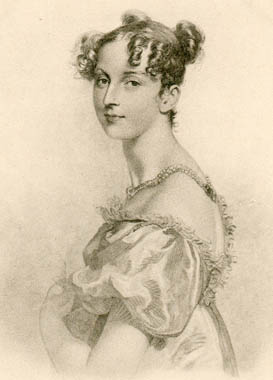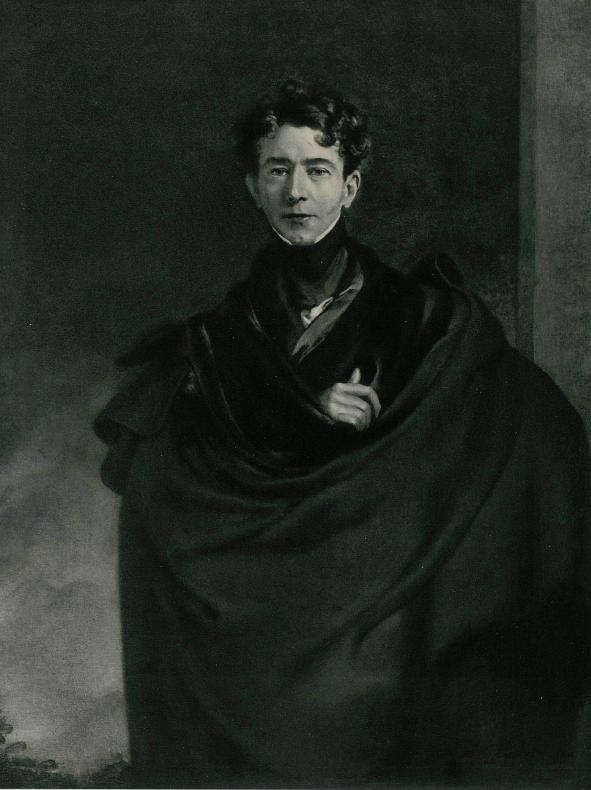 |
| Dorothea Lieven |
Almost as soon as her feet touched English soil George
summonsed Dorothea to Brighton. He was interested in the paternity of his
godson and namesake George Lieven. The king had ascertained a likeness to
himself in young George, who looked very much like his father and even more so
his grandmother (still going strong at 72).
George had a very vivid imagination, and was prone to
telling his courtiers of the battles he had fought in during the Napoleonic
wars. Dorothea was well aware of this propensity and informed Metternich;
‘Up
to the present he says it as a joke; in a few days he will be saying it
menacingly; later he will let it be understood that he had good reason for
saying it; and still later he will persuade himself that he really can take the
credit.’[i]
George, when not caught up in flights of fancy, was no fool
and he was not pleased by the breakup of the Quintuple Alliance.
George was well aware of the need to keep an eye on Canning. Dorothea flattered
George by telling him that his presence at Verona had been sorely missed.
Spanish Intrigues
 |
| Stratfield Saye |
Dorothea used the occasion of a visit to Stratfield Saye[ii] to stir up trouble
between Wellington and Canning, who had embarrassed Wellington in Verona. January
at Stratfield Saye was so cold that Dorothea had problems holding a pen[iii]. Dorothea found
Wellington rather a bore who was mostly happy to tell long rambling stories
about himself.
To counter Dorothea’s claims that he was a Jacobin Wellington showed
Dorothea his copies of the despatches he’d sent to London about the situation
in Spain.
 |
| Prince Esterhazy |
‘Damme,
I’ll show you what I wrote about Spain; and you will see if Metternich ever
said anything stronger.’[iv]
Dorothea persuaded him to show the papers to Christopher and
Prince
Esterhazy[v]
as well. But whatever Wellington’s opinion of matters in Spain, the British
public was firmly against intervention.
When French troops marched into their neighbour’s country
London shop windows were full of cartoons depicting Spanish patriots killing
the invaders. Canning, who had his finger on the pulse of public opinion,
refused to allow the sending of British troops to join the French.
The Anti-Canningites
Although popular with the country at large as a result of
his inflammatory speeches, Canning was not popular amongst his fellow
politicians and his sovereign detested him. Canning believed that a Europe
disunited would be good for Britain. Something the Whigs, Wellington and George
did not agree with.
 |
| Duke of Wellington |
Canning’s unpopularity in political circles and abroad
continued unabated. European politicians were not impressed by Canning’s
attempts to align Britain with every revolutionary movement going. Canning hoped
to take over leadership of the Tory party from Lord Liverpool whenever that
worthy resigned; this put him at odds with Wellington who considered the
succession as his.
The Lievens gave a dinner party for Canning and the
Austrian, French[vi]
and Prussian ambassadors were also guests. Wellington, sat on Dorothea’s right,
spent the dinner whispering rude things about Canning, sat on Dorothea’s left.
To counter Wellington, Canning showed off and even Lady Granville, one of his
friends, was unable to smooth matters over. Dorothea was feeling unwell and not
up to assisting Lady Granville. Afterwards Christopher reproached Dorothea for
not spending more time talking to Canning himself
A Loyal Ambassadress
 |
| Alexander von Benckendorff |
Paul had been sent back to school in Russia, under Alexander
von Benckendorff’s supervision. Her letters to Alexander imply that Paul was
viewed as a bad influence on his brothers;
‘I
am delighted to know that he is at school , and equally pleased to know that
you are prepared to show some sternness in dealing with him…..He has always
been extremely idle….he has always hindered his brothers’ progress that we
thought it advisable to separate them, and it must be allowed that since his
departure they have been going on famously.’[vii]
Dorothea had long outgrown her childish admiration for Christopher
who was called ‘Vraiment’ in
diplomatic circles, as this was the word he used most often. Christopher was
perfectly capable and used his wife dexterously to forward Russian interests.
Round about this time Dorothea started writing reports for Nesselrode,
supplementing the reports Christopher sent.
Dorothea was well-placed to act as liaison between Russia
and Britain; she was intimate with George IV and Lady Conygham and was good
friends with Wellington. Dorothea also kept Metternich informed with letters
sent via the Austrian Embassy. But, as she informed her lover;
‘Somebody
came and told me the other day, that I made an extremely clever compromise
between my duties and my personal views. I replied that I must do it far from
cleverly if people imagined that my duties and my personal views were not
identical.’[viii]
Desperate to keep Metternich’s attention focussed on herself
Dorothea kept dropping hints in her letters about a new admirer, Charles Lord Grey.
It is possible that Dorothea began an affair with Grey around this time to make
Metternich jealous.
Self-Imposed Exile
 |
| Metternich |
Dorothea suffered a setback in her health in May 1823 and
she wondered whether she was going into a decline. In the summer Dorothea
committed an indiscretion; giving out that she was travelling for her health
which could not support another British winter, Dorothea arranged to meet
Metternich in Milan.
Despite their imminent meeting Dorothea begged Metternich to
continue writing to her with news of what was going on in the world;
‘My
husband is the soul of prudence.....it is the same with the letters the Duke of
Wellington will write me. So, without you, I run the risk of relapsing
conventional feminine role; and it seems to me that it would be a pity.’[ix]
Dorothea got her kicks from being a powerful go-between and
was naturally reluctant to relinquish the importance placed on her by Nesselrode
and the Czar as a result of her liaison with a key player in Europe.
When she arrived in Milan Dorothea was disappointed to learn
that she would have little time with him, despite his promises. Dorothea spent
the winter in Florence, Rome where she met Lord Kinnaird[x], while Metternich
travelled around Europe desperate to keep up support for the Greek
insurrection. He did not reply to Dorothea’s letters or provocations.
Dorothea took four year old George with her to Italy and, as
ever when she was apart from him, Dorothea missed her husband as did George.
‘At
our age and with our experience, domestic happiness is the most important
thing, one cannot replace the confidence and habits of a marriage….Mon bon ami,
we are both suffering now because of our need for each other, which will still
bring us great happiness.’[xi]
 |
| Christopher von Lieven |
When Dorothea told Metternich that Christopher wanted her to
come home he did not respond to this provocation either. Dorothea was caught by
the lies she had told at home in order to travel abroad. Dorothea did not
return home until May 1824, her passion for Metternich all but spent. She was
met at Dover by Christopher and they travelled back to London.
Another Pregnancy
Dorothea now contemplated returning home to Russia to see
old friends. The British government offered her the King’s yacht to take her to
St Petersburg. She planned to meet Metternich in June en route.
Dorothea reached Dover when the journey halted, not to be
resumed. Christopher was the one who stopped Dorothea’s travelling when
Dorothea realised that she might be pregnant again. At the age of nearly forty
this was to be her sixth child and the journey home to Russia was long and
precipitous at the best of times.
 |
| Lady Conygnham |
Dorothea was the link between George, Wellington and
Metternich. Spending a lot of time at with George, Dorothea found herself
subject to George’s amorous attentions much to the irritation of Lady Conyngham.
Dorothea’s pregnancy was giving her the more voluptuous figure that George
preferred.
In July Wellington gave a grand dinner for the King; the
hated Canning and the Lievens were also invited. Dorothea flirted with and
embarrassed Canning. Dorothea asked him to dine and he in turned picked her
brains for information about the Parisian scene. They talked together at a
reception hosted by Lady Hertford.
In the autumn Dorothea commenced a correspondence with Lord
Grey. In later years she claimed that their relationship;
‘Remained
natural to our situations, he very English and I very Russian; but we allowed
ourselves a rare degree of confidence, which I never betrayed.’[xii]
In her correspondence Dorothea reported conversations
verbatim, useful for any politician, and witty social and political gossip
along with details of political events.
Dorothea and Christopher’s fifth son was born in late
February 1825 and named Arthur after Dorothea’s friend Wellington who was his
Godfather. The confinement had been difficult and for some time afterwards
Dorothea was confined to bed or a sofa. She wrote to her brother;
‘I
have another boy, much to our mutual regret…..he is remarkably pretty…..The
news Paul tells me of himself gives me great pleasure….he is delighted with his
start in life[xiii], and speaks in high
praise of the Foreign Office.’[xiv]
When Metternich’s wife Eleanore died in Paris in March 1825
and Dorothea wrote to console her friend.
Bibliography
The Princess and the Politicians – John Charmley, Penguin
Books 2006
Captain Gronow – Christopher Hibbert (ed), Kyle Cathie Ltd
1991
Wellington – Christopher Hibbert, Harper Collins 1997
Paris Between Empires – Philip Mansel, Phoenix Press
Paperback 2003
The Life and Times of George IV – Alan Palmer, Book Club
Associates 1972
Princess Lieven’s Letters – Lionel G Robinson (ed),
Longmans, Green & Co 1902
The Russian Empire – Hugh Seton-Watson, Oxford University
Press 1988
Metternich – Desmond Seward, Viking 1991
Arch Intriguer – Priscilla Zamoyska, Heinemann Ltd 1957
www.wikipedia.en
[i]
The Princess and the Politicians - Charmley
[ii]
Wellington’s country home, bought by a grateful nation in 1817 for £263,000; in 2014 the relative: historic standard of
living value of that income or wealth
is £17,200,000.00 economic status value of
that income or wealth is £323,900,000.00 economic power value of that income or wealth is £1,029,000,000.00 www.measuringworth.com
[iii]
The Duchess of Wellington was not a capable lady of the house and the rooms at
Stratfield Saye were insufficiently heated
[iv]
Arch Intriguer - Zamoyska
[v]
Austrian ambassador to Great Britain
[vii]
Princess Lieven’s Letters – Robinson
[viii]
Arch Intriguer - Zamoyska
[ix]
The Princess and the Politicians - Charmley
[x]
A friend of Byron’s
[xi]
Arch Intriguer - Zamoyska
[xii]
Ibid
[xiii]
Nesselrode had given him a job
[xiv]
Princess Lieven’s Letters – Robinson
No comments:
Post a Comment
Note: only a member of this blog may post a comment.